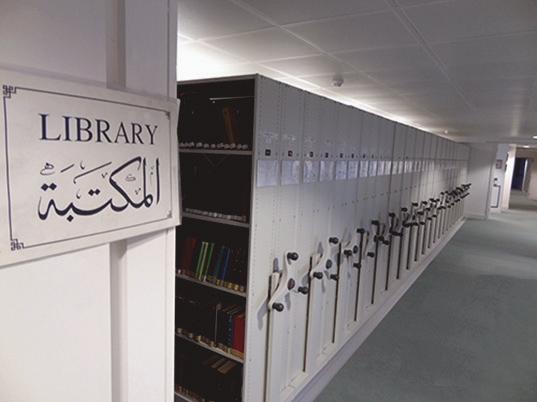
4 minute read
Message from the Chairman
It is a source of delight to reach you - cherished followers of AlFurqān Islamic Heritage Foundation - through this Newsletter, in order to present the Foundation’s activities and projects.
At this time, the entire world is living in an exceptional and unprecedented situation; the Corona virus pandemic ushered in a plethora of difficulties and complications, including closure of most scientific, cultural, and educational institutions, and provoking hitherto unanticipated, seismic shifts across many domains, globally.
Advertisement
Despite this calamity, and the hurdles in carrying on activities and events as normal, Al-Furqān Foundation continues to pursue its mission of preserving, protecting and serving the Muslim nation’s abundant heritage. Indeed, this heritage is one of the primary reasons for the Muslim civilisation’s rise and success in the sciences - revealed, rational, or empirical. It represents the Muslim nation’s collective memory, chronicled knowledge, and foundation of renaissance.
In order to achieve this noble goal, the Centre for the Study of Islamic Manuscripts at the Foundation continues its mission of searching for manuscripts across the globe; locating, documenting, cataloguing, critically editing, and publishing them. In addition to this, , the Centre works to fuel the enthusiasm of budding young researchers, encouraging them to acquire the means of understanding this heritage, and the tools of critical edition. The aim is to ensure robust foundations in the trajectory of serving this great heritage, and continuing our forefathers’ journey to brighter future horizons.
In this respect, over the past months, the Centre for the Study of Islamic Manuscripts reprinted the conference proceedings entitled “Earth and its Sciences in Islamic Manuscripts”, edited by Dr Ibrahim Chabbouh. The Centre also published the proceedings of its Ninth Conference “The Noble Qur’ān from Revelation to Compilation 2”, and, in the forthcoming months, aims to release: “Kashf al-ẓunūn ‘an asāmī al-kutub wa al-funūn”, by Kâtip Çelebi, critically edited by Professor Ekmeleddin İhsanoğlu and Professor Bashar Awwad Marouf (and his team) ; “Nuzhat al-mushtāq fī tārīkh ‘ulamā’ al-‘Irāq” by ‘Abd al-Ghaffūr al-Raḥbī al-Baghdādī, critically edited by Dr Mahdi al-Jumaili; “Kitāb al-ibānah wa al-i‘lām bi mā fī al-Minhāj min al-khalal wa al-awhām” by Ibn al-Baiyṭār, critically edited by Dr Ibrahim Ben Mrad; “Al-Istidhkār” by Ibn ‘Abd al-Barr, critically edited by Professor Bashar Awwad Marouf and his team of editors; and “Miftāḥ al-sa‘ādah wa miṣbāḥ al-siyādah” by Ṭāsh Kubrī Zādah, critically edited by Professor Ahmed Chouqui Binebine, Dr Muhammad Said Hinchi, and Dr Abdul Aali Lemdabbar. In the domain of cataloguing, the Centre will publish “Fihris makhṭūṭāt Āyaṣofyā bi al-maktabah al-Sulaymāniyyah”, prepared by a group of cataloguers, and edited by Prof. Dr. Ramazan Şeşen. Furthermore, under bibliographic studies, the Centre aims to publish the book, “Al-Turāth al-‘ilmī al-‘Uthmānī”—an encyclopaedic work prepared and supervised by Professor Ekmeleddin İhsanoğlu in Turkish, and translated by Professor Majda Makhlouf.
The Foundation continues to focus its attention on its pioneering, knowledgeable, cultural and civilisational project, The Encyclopaedia of Makkah Al-Mukarramah and Al-Madīnah AlMunawwarah, which highlights the immense value of these two noble cities to Islamic civilisation, and their vital, crucial roles in diverse domains over the centuries.
Through the Centre for the Study of the Philosophy of Islamic Law, the Foundation exerts its utmost effort to achieve its mission of reviving and promoting objectives-based thought, and its application to reality, while stimulating quality research into objectives (maqāṣid); in addition, supporting novel studies in the jurisprudence of priorities (fiqh al-awlawiyyāt), the jurisprudence of Divine laws of life (fiqh al-sunan al-Ilāhiyyah), utilities and outcomes (almanāfi‘ wa al-ma’ālāt); furthermore, inviting scholars and Islamic organisations involved in issuing fatwas to highlight the connection between texts (nuṣūṣ), rulings (aḥkām), and objectives (maqāṣid), in their fatwas and researches. In this regard, the Centre published the book, “Ta‘addud al-marji‘iyyah fī ḍaw’ maqāṣid al-sharī‘ah al-Islāmiyyah”, authored by Professor Noureddine Khadmi; while the book “Maḥāsin al-sharī‘ah fī furū‘ fiqh al-Shāfi‘iyyah” by alQaffāl Shāshī, renowned as al-Qaffāl al-Kabīr, critically edited by Professor Abdul Hamid Madkour, is due for release shortly. Over the previous year, alongside these projects and publications, the Foundation has worked diligently to improve its infrastructure, in order to make its projects, studies, publications and activities visible to the largest possible number of interested persons, and in an easily accessible and engaging format, to ensure the greatest benefit. Hence, it reworked its Website—its window to the world, and platform for scholars, researchers, and students in the domain of Islamic civilisation and heritage. The New Website is more content-driven than ever before, and provides a more in-depth perspective into the Foundation and its work. In the previous months, the Foundation also continued to enrich its Digital Library, representing a growing repository of bibliographic information on Islamic written heritage, which is accessible to everyone on the Internet. Moreover, expanding the Reference Library in London, containing a collection of specialised and rare references and sources on Islamic written heritage, with the aim of supporting scientific research in the heritage domain, and making tools and references available, particularly to interested researchers and students in the areas of Islamic manuscript studies.
In conclusion, I am pleased to offer my sincere gratitude and appreciation to all those who stood by us—gracious professors, students, researchers, and readers, who lent their support by tendering advice, guidance, and encouragement. To all we say, may Allāh reward you abundantly for your excellent engagement with these achievements, which we owe in every way to Allāh, the Almighty; to Him we are most grateful, and from Him, we draw support. Our thanks go also to our outstanding team of staff, , who have exerted great effort and spent valuable time, placing themselves at the service of this civilisational endeavour.
Allāh is the Benefactor of all success, and to Him belongs all praise, at every beginning and end… Ahmed Zaki Yamani










